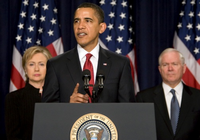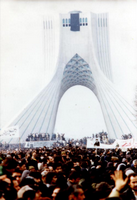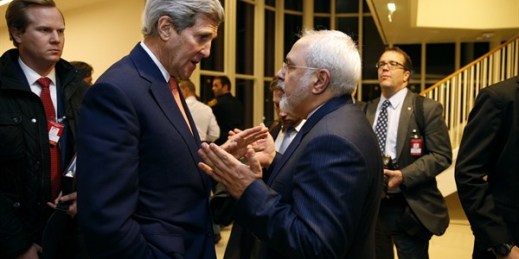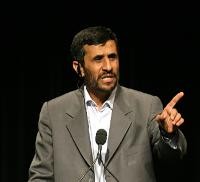I wanted to revisit this post on the growing meme of President Barack Obama as weak and vacillating, in which I said that on Israel-Palestine, Afghanistan and Iran, “there definitely seems to be a hesitation on following through on initial convictions and openings. . . . Obama has blinked.” Because in trying to address a number of interconnected trains of thought, I might have crossed some of the tracks up. To begin with, on Afghanistan, I don’t think Obama is wrong to pause and consider the strategic objectives before signing off on the resources requested. The problem is that I […]
Iran Archive
Free Newsletter
When it comes to making sense of the options on Iran, the frustrating thing is that none of them are likely to work. That leads to debates where everyone very smartly rebuts the opposing viewpoint, only to defend an equally unsatisfactory proposition. I accept that actually getting meaningful sanctions applied — that is, overcoming Russian and Chinese obstructionism — is a longshot. I also concede that sanctions might not succeed in changing Tehran’s political calculus regarding its nuclear program. But most people who advance those two arguments tend to use them to justify one of three approaches: accept a nuclear […]
Let’s face it, the meme that’s currently taking shape is that President Barack Obama is weak and vascillating. And that’s a particularly lethal meme for a foreign policy oriented around engagement, cooperation, shared responsibility and a careful husbanding of dwindling U.S. power resources. Is it a fair characterization? It leaves out a number of policy positions where he has taken bold initiatives and followed them up well. His nuclear nonproliferation agenda, for instance, which I initially dismissed but have since come to appreciate, offers promising openings on a number of fronts. His handling of the much-needed U.S. image makeover, too, […]
Iran produces a wealth of homegrown popular movies, music andliterature. Iranian popular culture thrives under the watchful eyes ofgovernment censors — in part by creatively pushing the boundaries ofwhat is permissible, and in part by using the Internet and technology to avoid those limitsaltogether. Worldfocus correspondent Bigan Saliani and producer Richard O’Regan report.
Update: The IAEA press office has just released a statement to the effect that the enrichment facility referred to in the news report is a pilot fuel enrichment facility that is now under construction. Iran informed the agency of its existence on Sept. 21, stating that enrichment will be up to 5 percent, and that no nuclear material has yet been introduced to the facility. This would call for dialing down the following post a few notches in terms of urgency, since the facility is not a fully operational one that had been kept from IAEA inspectors. But the general […]
Russian President Dmitry Medvedev emerged from a meeting with U.S. President Barack Obama with a more open attitude toward tougher sanctions against Iran in the event negotiations over Tehran’s nuclear program don’t produce results. That’s a pretty quick dividend from the missile defense decision, but I think Nikolas Gvosdev is spot on here: But the crux of the matter for the U.S. is not when Tehran crosses theline and has a working bomb, it is trusting Iran to have a nuclearinfrastructure like Japan’s. I think that Russia will be far moresupportive of “trusting” Iran with nuclear technology than a U.S. […]

The decision by the Obama administration to drop the missile defense plan in Eastern Europe was based on a revised perception of Iran’s long-range missile threat. The move is bound to have multiple and contradictory effects on the thorny issue of Iran’s nuclear program, which is slated to be a central subject of multilateral discussions at the opening of the U.N.’s General Assembly this week, as well as at the G-20 gathering in Pittsburgh days later. Diminishing the threat perception of Iran’s missile program from previous assessments under the Bush administration is certainly conducive to the IAEA — that is, […]
In this interview with Gary Thomas of Voice of America, CIADirector Leon Panetta says President Hamid Karzai will in alllikelihood still emerge as the winner of the presidentialcontest in Afghanistan, even after contested votes are thrown out.Panetta also says there aredifferences among Iran’s leaders about whether to actually build anuclear bomb, and he talks about the CIA’s reaction to the U.S.attorney general’s investigation into interrogation techniques.
It looks like President Barack Obama is getting his Iran ducks lined up in advance of the meeting scheduled between the P5+1 and Iran in October. Duck 1: On Tuesday, Obama spoke with French President Nicolas Sarkozy by telephone for a half-hour, during which Iran was a central topic of conversation. PressTV later reported that on Tuesday, too, Sarkozy told lawmakers from his governing UMP, “It is a certainty to all of our secret services. Iran is working today on a nuclear [weapons] program.” I’m still trying to confirm that Sarkozy actually made those remarks, since although AFP picked up […]
U.S. President Barack Obama announced a new phased, adaptive approach for missile defense in Europe, a revision of the Bush administration’s 2007 plan for missile defense. The administration says the new approach is based on an assessment of the Iranian missile threat, and a commitment to deploy technology that is “proven, cost-effective, and adaptable to an evolving security environment.”

There is an important element missing in the extensive coverage of Afghanistan: multilateral diplomacy. The Obama administration has been correct to emphasize the stakes for Pakistan in Afghanistan and, by extension, the seriousness with which the U.S. takes Pakistan’s stability. But it has begun to sound like Afghanistan has only one border, and only one important neighbor. So far, the administration and the media’s portrait has oversimplified the nature of the Taliban insurgency, defining it as essentially an extension of the fragility of the Pakistani state and political system. In truth, Pakistan is probably more stable than it looks, however […]

The government of Iran struggled for decades to fit into the broader Middle East, and it has finally succeeded: It now sees its people principally as a source of instability rather than a source of legitimacy. Thirty years after the Revolution, the Iranian government has concluded that it is far better to anesthetize the population than mobilize it. It is a conclusion from which there is no turning back. The Middle East has no shortage of formerly youthful revolutionary regimes that have slunk into middle age. In decades past, coups in Egypt, Iraq and Libya all tossed out corrupt Western-oriented […]

The problem with withholding diplomatic relations to punish countries and change their behavior is that it usually doesn't work. In the meantime, the absence of relations robs America of a key diplomatic skill and the ability to intervene in a crisis. In recent years, many American officials have regarded withholding diplomatic relations as a way to punish countries for actions ranging from human rights abuses, to failure to abide by international law, to specific treaty violations and acts of war. But state-to-state relations among nations provide an essential framework for the conduct of foreign relations. Having no relations, and the […]

Note: The following opinion piece was submitted in response to last week’s WPR briefing, “Engaging Iran: An Interview with R. Nicholas Burns.” As both a news and analysis journal, WPR is committed to airing all sides of acontested issue, so long as they are respectfully expressed. Global diplomacy surrounding Iran’s nuclear standoff is very likely to reach a critical fork in the road this fall. In the coming weeks and months, this potentially dangerous crisis could either escalate or veer toward hopeful signs of a mutually satisfactory resolution. Ahead of the G-20 summit in St. Petersburg as well as the […]
